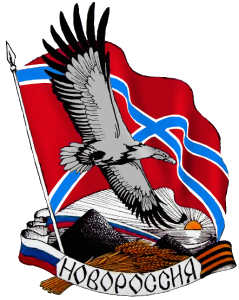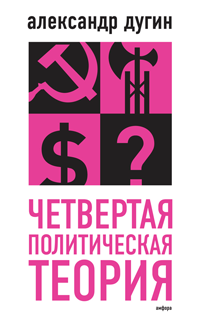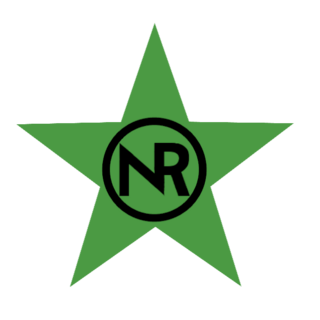Geopolitics is the study of the effects of Earth's geography on politics and international relations. While geopolitics usually refers to countries and relations between them, it may also focus on two other kinds of states: de facto independent states with limited international recognition and relations between sub-national geopolitical entities, such as the federated states that make up a federation, confederation, or a quasi-federal system.

The Eurasia Party is a National Bolshevik Russian political party. It was registered by the Ministry of Justice on 21 June 2002, approximately one year after the pan-Russian Eurasia Movement was established by Aleksandr Dugin.

Aleksandr Gelyevich Dugin is a Russian far-right political philosopher.

The National Bolshevik Front is a Russian political party with a political program of National Bolshevism. The party was founded in 2006 by supporters of Aleksandr Dugin following a split within Eduard Limonov's National Bolshevik Party. The NBF is affiliated with Dugin's Eurasian Youth Union.

The Symbol of Chaos originates from Michael Moorcock's Elric of Melniboné stories and their dichotomy of Law and Chaos. In them, the Symbol of Chaos comprises eight arrows in a radial pattern.
Neo-Stalinism is the promotion of positive views of Joseph Stalin's role in history, the partial re-establishing of Stalin's policies on certain or all issues, and nostalgia for the Stalinist period. Neo-Stalinism overlaps significantly with neo-Sovietism and Soviet nostalgia. Various definitions of the term have been given over the years.

Mateusz Andrzej Piskorski is a far-right Polish politician and publicist.
Eurasianism is a socio-political movement in Russia that emerged in the early 20th century under the Russian Empire, which states that Russia does not belong in the "European" or "Asian" categories but instead to the geopolitical concept of Eurasia governed by the "Russian world", forming an ostensibly standalone Russian civilization.

Russian nationalism is a form of nationalism that promotes Russian cultural identity and unity. Russian nationalism first rose to prominence as a Pan-Slavic enterprise during the 19th century Russian Empire, and was repressed during the early Bolshevik rule. Russian nationalism was briefly revived through the policies of Joseph Stalin during and after the Second World War, which shared many resemblances with the worldview of early Eurasianist ideologues.

Leonid Grigoryevich Ivashov is a Russian military and public official. He is a former President of the Academy for Geopolitical Problems and a retired Colonel-General.

The Eurasian Youth Union is a Russian traditionalist political organization, the youth wing of the Eurasia Party headed by Aleksandr Dugin. The organization has branches in several countries. In 2011, the Government of Ukraine has branded the ESM as an extremist anti-Ukrainian organization, convicted of a string of vandalism offenses and banned it in Ukraine.
Conspirology is a term the Russian philosopher Aleksandr Dugin coined in his work Konspirologiya: Nauka o zagovorah, tajnyh obshhestvah i okkultnoj vojne. Accordingly, it is a framework which studies conspiracy theories, secret societies, and their geopolitical conflicts, from the perspective of esoteric thought, non-Catholic eschatology, demonology, and the occult,as opposed to religious studies. Dugin primarily uses it to cover the conflict between what he considers to be Atlanticism and Eurasianism.

National Bolshevism, whose supporters are known as National Bolsheviks and colloquially as Nazbols, is a syncretic political movement committed to combining ultranationalism and Bolshevik communism.

The New Russia Party, or Novorossiya Party, is a political party operating in Ukraine, and in particular regions of Ukraine annexed by Russia The organization was founded by pro-Russian separatists, under the leadership of Pavel Gubarev, on 14 May 2014. The party is formally known as the Social-Political Movement "New Russia Party". It is not registered with the Ministry of Justice of Ukraine.

The Fourth Political Theory is a book by the Russian philosopher and political analyst Aleksandr Dugin, published in 2009. In the book, Dugin states that he is claiming the foundations for an entirely new political ideology, the fourth political theory, which integrates and supersedes liberal democracy, Marxism, and fascism. In this theory, the main subject of politics is not individualism, class struggle, or nation, but rather Dasein.

Ruscism, also Rashism or sometimes Russism, is a derogatory term used by a number of scholars, politicians and publicists to describe the political ideology and the social practices of the Russian state in the late 20th and early 21st centuries, especially during the rule of Vladimir Putin. It is also used in reference to the ideology of Russian military expansionism, and has been used as a label to describe an undemocratic system and nationality cult mixed with ultranationalism and a cult of personality. That transformation was described as based on the ideas of the "special civilizational mission" of the Russians, such as Moscow as the third Rome and expansionism, which manifests itself in anti-Westernism and supports regaining former lands by conquest. Ukrainian officials and media often use 'Rashist' to broadly refer to members and backers of the Russian Armed Forces.
The Primakov doctrine is a Russian political doctrine formulated in the 1990s. It assumes that the national security of Russia relies on its superpower status and therefore Russia cannot allow the formation of a unipolar international order led by the United States.
Elementy was a political magazine which was started and published by Russian political philosopher Aleksandr Dugin. Its subtitle was Evraziiskoe Obozrenie. It existed between 1992 and 2000 and was the mouthpiece of neo-Eurasianism in Russia.

New Resistance is a Brazilian national-revolutionary organization with an anti-liberal, anti-capitalist and traditionalist political orientation. The organization is considered pro-Russian and supportive of the views of Russian philosopher Aleksandr Dugin.
Robert Steuckers is a Belgian writer and political activist on the far right, associated with the European New Right. He is a former member of GRECE and formed his own organisation Synergies européennes in 1994. He promotes pan-European nationalism and has been described as close to the Identitarian movement.














